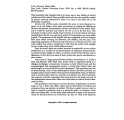TO
1 - 25 of 4
| Creator | Title | Description | Subject | Date | ||
|---|---|---|---|---|---|---|
| 1 |
 | White, Nicholas P. | Forms and sensibles: Phaedo 74B-C | In Phaedo 74b6-c6 Plato offers an important argument for the proposition that such things as "the equal itself," i.e. such things as are often called "Forms," are distinct from sensible objects. The argument is especially important because it is one of a very small number of explicit arguments-perha... | Plato; Forms; Sensibles | 1987 |
| 2 |
 | White, Nicholas P. | Plato's Ethics (Book Review) | Reviews the book `Plato's Ethics,' by Terence Irwin. | Books; Plato; Ethics | 2001-09-16 |
| 3 |
 | White, Nicholas P. | Review of Suzanne Mansion, 'Etudes Aristoteliciennes: receuils d'articles | This volume is a posthumous collection of articles, all previously published and almost all on Aristotle, by Suzanne Mansion, along with a list of her scholarly works (xviiixxi). The articles printed here are reproduced photographically along with their original pagination, and a continuous paginati... | Aristotle; Plato; Ancient Philosophy | 1988 |
| 4 |
 | White, Nicholas P. | Rulers' choice | Plato undertook in the Republic to show that "it is in every way better to be just than unjust" (Book II, 357b1 -- 2). What did he mean by this? I would like to focus on two relevant questions. 1) Did he believe that invariably the more just a person is, the better it is for him? We should prefer t... | Republic; Plato; Justice | 1986 |
1 - 25 of 4
